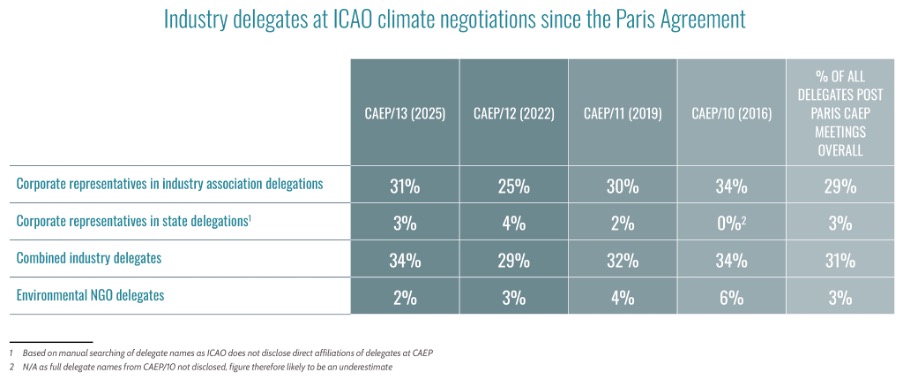New InfluenceMap research published today in The Guardian finds that persistently opaque disclosure practices and significant industry presence at the UN International Civil Aviation Organization (ICAO) have led to the development of climate measures that are aligned with industry requests, indicating that proceedings have been "captured" by vested interests. This poses a significant risk to the development of regulation to tackle aviation sector emissions at this year’s ICAO assembly meeting, which will take place in Montreal next week.
InfluenceMap analysis of attendance at CAEP/13—which is the industry's triannual Environmental Committee meeting—reveals that industry delegates outnumbered environmental delegates 14:1, an even higher proportion than at the last two CAEP meetings in 2022 and 2019 (where the ratios were 10:1 and 7:1, respectively). Corporate representatives made up 34% of delegates overall, with eight state delegates currently employed by the aviation or fossil fuel industries. Through LinkedIn searches of registered delegates, InfluenceMap was also able to identify numerous aviation and fossil fuel employees who are members of CAEP working groups, where they help to shape the research underlying ICAO’s environmental policies.

The OECD defines policy capture as “encompassing any situation where the decisions taken in a policy cycle mainly reflect the interests of a narrow interest group.” This is particularly concerning in the aviation sector, where InfluenceMap’s assessment of climate lobbying finds that some international industry associations in attendance at CAEP are among the most obstructive corporate actors. Recently, some of the largest actors in this space have begun to roll back climate commitments. For example, in 2007, the International Air Transport Association (IATA) set a 10% sustainable aviation fuel (SAF) target by 2017, but this year it predicts only 0.7% of jet fuel will be SAFs.
InfluenceMap repeatedly finds that ICAO’s positions on climate policy mirror industry demands. For example, ICAO appears to be following industry’s opposition to environmental taxation. In the CAEP/13 report, it was stated that ICAO had emphasized that delegates should express concerns with proposals for environmental taxation of aviation to fund climate finance, something it also reiterated in its April 2025 newsletter. InfluenceMap has tracked long-standing opposition to similar taxes from IATA, Airlines For America, both of which are present at CAEP meetings. In the past, IATA appears to have proposed and helped develop ICAO’s main rule for aviation—the Carbon Offsetting and Reduction Scheme for International Aviation (CORSIA). It then successfully advocated for the rule as it was proposed to be weakened. CORSIA has been widely criticized, including by the Intergovernmental Panel on Climate Change, which describes CORSIA as a transitional arrangement “at its best”.
Further analysis of the negotiations at CAEP/13 reveals no change in its transparency or accountability processes since 2022 when InfluenceMap found industry actors to have outsized influence over global climate rules for aviation. Key aspects of policy development, such as input from states and industry, remain confidential: meetings are closed to the media, submissions are not publicly released, and delegates are required to sign NDAs to attend. These practices are out of line with other UN bodies, such as the International Maritime Organization (IMO) and the UNFCCC—both of which have made more progress on climate policy measures within their respective remits. In contrast, climate policy for international aviation remains insufficient to meet net-zero goals.
Though CAEP/13 happened in February 2025, the meeting report was published seven months later in September, only 11 days before the ICAO Assembly. The report contained attendance (without company affiliation) and anonymized information on meeting contributions.
Lucca Ewbank, Program Manager for Transport at InfluenceMap, said:
This report lays out a clear case of corporate capture in global environmental policy, with no sign of change since transparency issues were raised in 2022. Industry lobbyists, with a history of opposition to climate action, continue to dominate decision-making processes at ICAO, relying on closed door meetings to cement their influence. Airlines and industry associations are ignoring the warning lights and prioritizing industry interests over essential emissions cuts - with only a weak offsetting policy and non-binding targets to show for years of deliberation. In order for the aviation sector to meet the existential challenge of climate change, ICAO needs a hard course correction. One that prioritizes public interests, science-based policies and open negotiations, so that independent experts and civil society can come together with industry in good faith, and so that industry can begin to take real responsibility for the climate impact of the aviation sector.
Kitty Hatchley, Media Manager, InfluenceMap (London)
Email: kitty.hatchley {@} influencemap.org